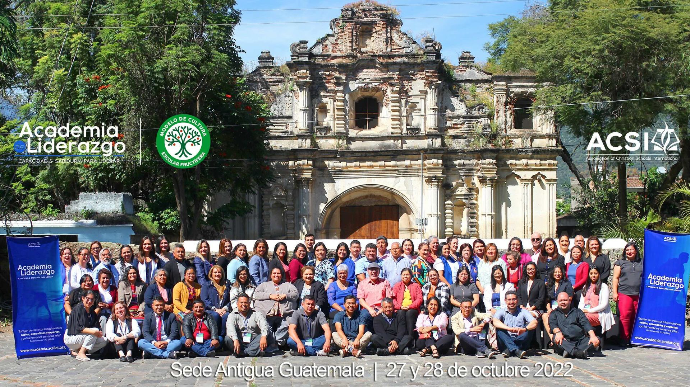
About Us
ACSI es una organización profesional que sirve a escuelas cristianas a nivel mundial desde 1978. Promueve la excelencia en las escuelas cristianas mediante el desarrollo profesional y personal de los educadores. Con más de 25,000 escuelas en 108 países, ACSI apoya a más de 5.5 millones de estudiantes en todo el mundo con una cosmovisión cristiana de la educación basada en las Sagradas Escrituras.
La oficina continental de ACSI para Latinoamérica (ACSI LATINOAMÉRICA) ha estado operando en Guatemala desde 1990, proporcionando servicios como certificación docentes y liderazgo educativo, acreditación internacional y mejora escolar continua para centros educativos. Además, a través de ACSI REDUCA, ofrece series curriculares en español e inglés, libros de desarrollo profesional y otros. Servimos a la región mediante 4 oficinas regionales ubicadas en Guatemala, Colombia, Paraguay, República Dominicana y Brasil.
Our History
Association of Christian Schools International nace en 1978 como resultado de la fusión de tres asociaciones regionales de escuelas cristianas en Estados Unidos. Sus fundadores fueron el Dr. Roy Lowrie Jr. y el Dr. Paul Kienel, quien sirvió como el primer Director Ejecutivo.
Desde el principio, se tuvo la intención de servir a centros educativos en todo el mundo, lo que llevó a la inclusión de la palabra 'internacional' en su nombre, gracias a la visión de uno de los cofundadores, el Dr. Gene Garrick. La primera sede de ACSI se estableció en el sur de California, una región con una alta concentración de escuelas cristianas
Hasta 1988 la mayoría de escuelas miembros de la asociación se encontraba en Norteamérica con algunas escuelas internacionales miembros sirviendo a la comunidad misionera.
En 1989, el Dr. Phil Renicks, Director de Misiones de ACSI, conoció a Estuardo Salazar y su esposa Sheny, gracias al contacto promovido por George Runner, director de una escuela de las escuelas cristiana más grandes en California.
En febrero de 1990, la Asamblea General de ACSI comisionó a los esposos Salazar para servir como los primeros directores regionales no estadounidenses ubicados fuera del territorio norteamericano.
The ACSI Latin America office opened its doors in Guatemala City on April 2, 1990, organizing the first National Convention of Evangelical Educators six months later. The first book published was the Encyclopedia of Biblical Truths for School Subjects, followed shortly after by the curricular series Fundamentals of Character. Gilda Patricia Cifuentes was the first secretary to share office space with the Salazar spouses on the tenth level of the El Centro Building, in zone 1 of Guatemala City. The office equipment was an Apple Macintosh SE computer, an Apple ImageWriter II printer, and a Panasonic FAX machine.
From 1990 to 2000 was a decade of accelerated expansion. Stuart visited every country on the continent, organizing conferences and conventions to publicize this ministry. Educational leaders from each country were identified and at the end of that decade they met in Guatemala at a symposium called Summit 2000. A year later, in Foz de Iguazú, a Summit 2001 was reproduced for the Southern Cone and Brazil. strategic objectives that would mark the second decade of ACSILAT
The decade from 2001-2010 was one of strategic growth. Offices were established in Paraguay, Brazil and the Dominican Republic. Technology began to be used more effectively. Conventions, leadership conferences, and more publications attracted high membership numbers. New resources, programs and services were developed and the team of collaborators grew to become the largest ACSI office internationally.
The third decade of ACSI Latin America is characterized by solid consolidation. Signs of organizational maturity appear, such as the establishment of ACSI Educational Resources, the implementation of a healthy functional governance scheme, and the clear definition of roles and responsibilities in the team. New representations, alliances and distributions establish ACSI's presence in key countries. The COVID crisis tests the strength of the organization.
The best is yet to come. A blessed leadership succession process is anticipated. The new decade must be characterized by adaptive innovation. New scenarios point towards a renewed way of formulating and advancing the mission. The global climate of accelerated change forces the necessary adaptability. What does not change is the vision and commitment to transform the future of Latin America through Christian education.